PPMP20008 Lessons Learnt Assignment: Reflection and Strategy
VerifiedAdded on 2023/04/20
|7
|1630
|211
Homework Assignment
AI Summary
This assignment, completed by a student, focuses on lessons learnt through reflective practice and the development of improvement strategies. The introduction highlights the importance of observation and cognitive learning theory in enhancing learning. The student outlines their initial plan for gathering and documenting lessons, including the sources consulted and the methods used for data storage. The assignment then details what actually happened, contrasting the planned approach with the reality of the learning process, including the influences encountered. The core of the assignment presents three specific lessons, each detailing a situation, the associated feelings, and the insights gained. Each lesson is accompanied by a proposed improvement strategy, along with methods for measuring its effectiveness, justifications for its achievability, and the relevance and timeframe for implementation. The assignment concludes by emphasizing the need for a strategic approach to improve the learning process, with the integration of group discussions and the evaluation of performance. The student references relevant literature to support their analysis and strategies.
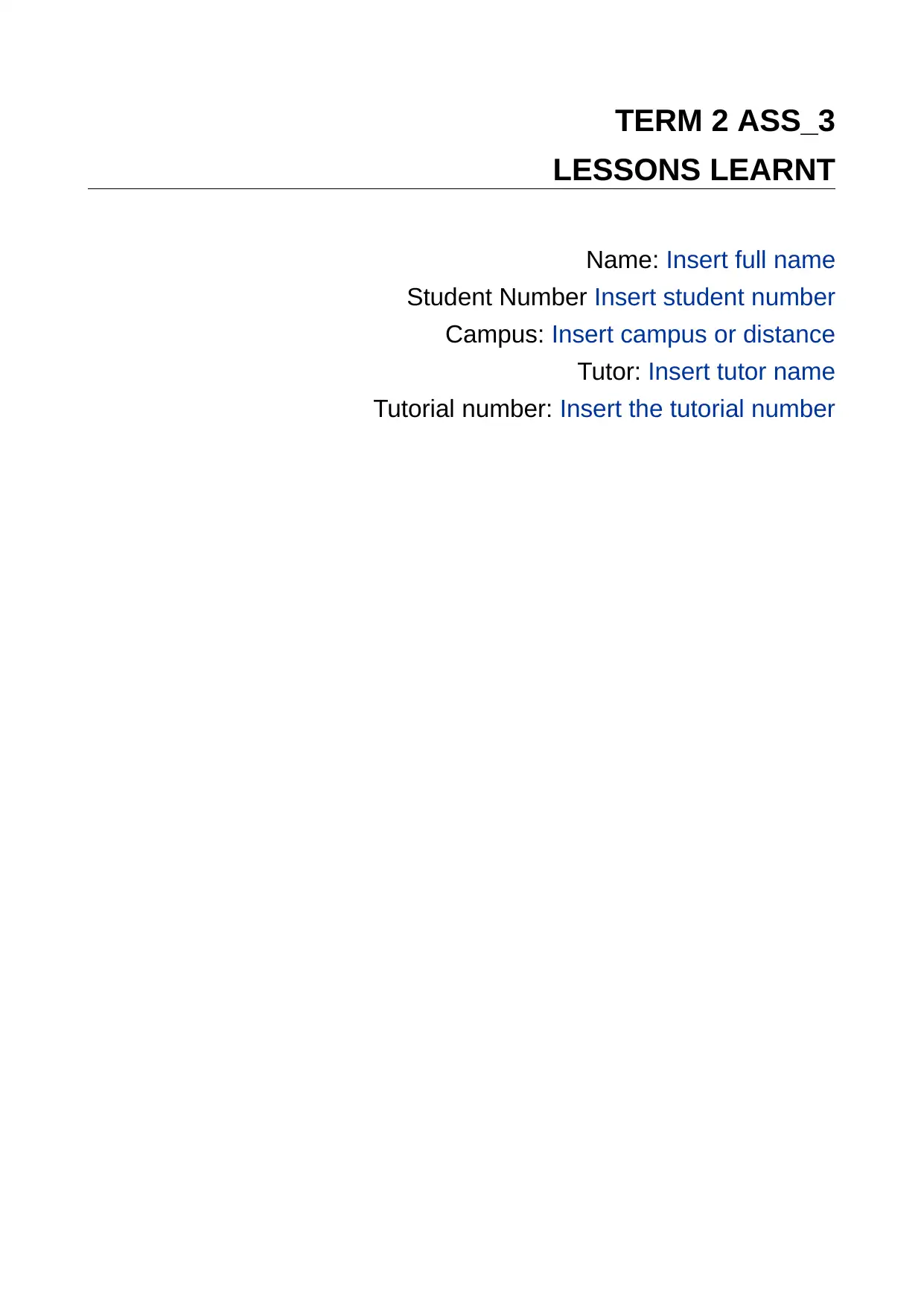
TERM 2 ASS_3
LESSONS LEARNT
Name: Insert full name
Student Number Insert student number
Campus: Insert campus or distance
Tutor: Insert tutor name
Tutorial number: Insert the tutorial number
LESSONS LEARNT
Name: Insert full name
Student Number Insert student number
Campus: Insert campus or distance
Tutor: Insert tutor name
Tutorial number: Insert the tutorial number
Paraphrase This Document
Need a fresh take? Get an instant paraphrase of this document with our AI Paraphraser
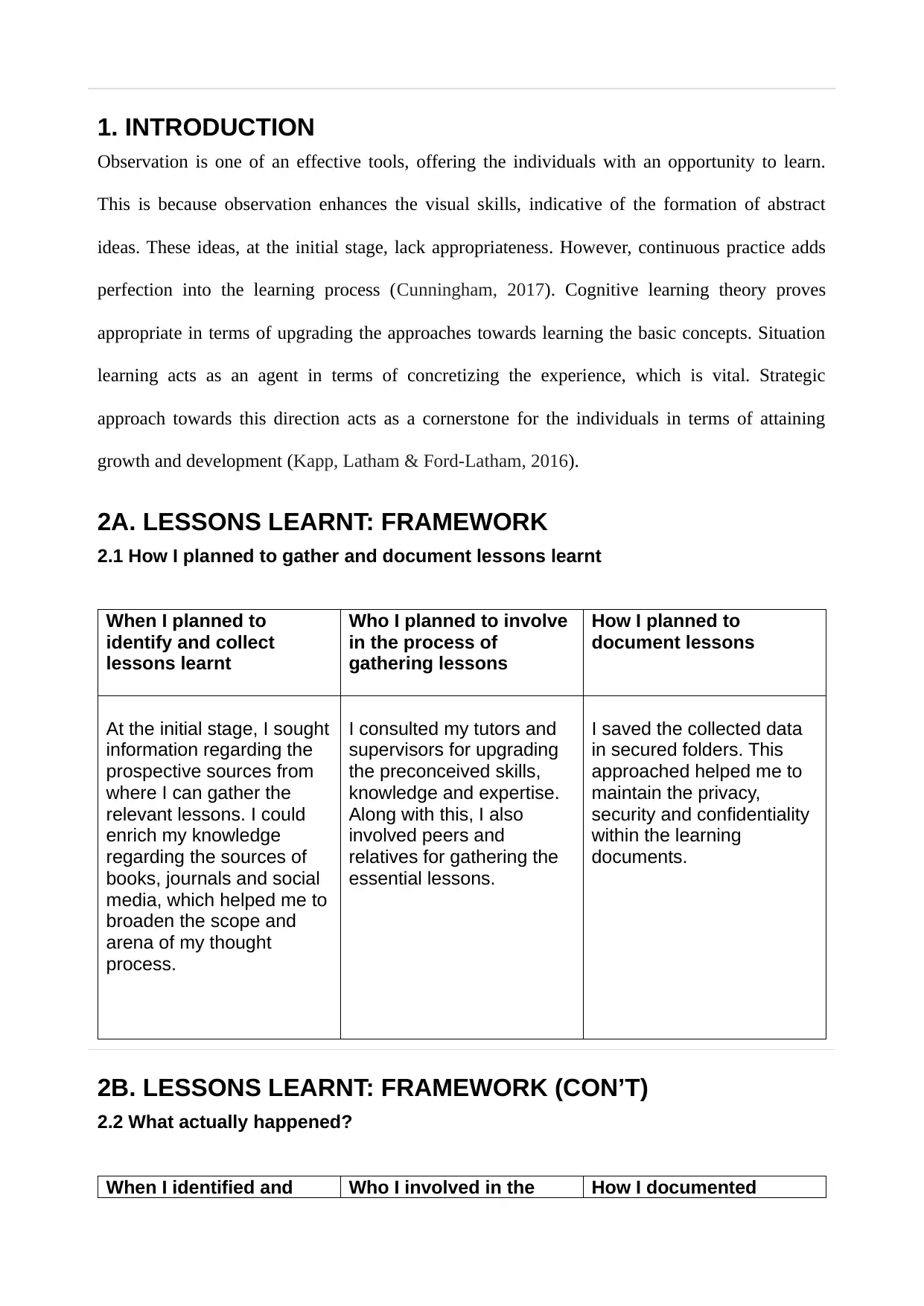
1. INTRODUCTION
Observation is one of an effective tools, offering the individuals with an opportunity to learn.
This is because observation enhances the visual skills, indicative of the formation of abstract
ideas. These ideas, at the initial stage, lack appropriateness. However, continuous practice adds
perfection into the learning process (Cunningham, 2017). Cognitive learning theory proves
appropriate in terms of upgrading the approaches towards learning the basic concepts. Situation
learning acts as an agent in terms of concretizing the experience, which is vital. Strategic
approach towards this direction acts as a cornerstone for the individuals in terms of attaining
growth and development (Kapp, Latham & Ford-Latham, 2016).
2A. LESSONS LEARNT: FRAMEWORK
2.1 How I planned to gather and document lessons learnt
When I planned to
identify and collect
lessons learnt
Who I planned to involve
in the process of
gathering lessons
How I planned to
document lessons
At the initial stage, I sought
information regarding the
prospective sources from
where I can gather the
relevant lessons. I could
enrich my knowledge
regarding the sources of
books, journals and social
media, which helped me to
broaden the scope and
arena of my thought
process.
I consulted my tutors and
supervisors for upgrading
the preconceived skills,
knowledge and expertise.
Along with this, I also
involved peers and
relatives for gathering the
essential lessons.
I saved the collected data
in secured folders. This
approached helped me to
maintain the privacy,
security and confidentiality
within the learning
documents.
2B. LESSONS LEARNT: FRAMEWORK (CON’T)
2.2 What actually happened?
When I identified and Who I involved in the How I documented
Observation is one of an effective tools, offering the individuals with an opportunity to learn.
This is because observation enhances the visual skills, indicative of the formation of abstract
ideas. These ideas, at the initial stage, lack appropriateness. However, continuous practice adds
perfection into the learning process (Cunningham, 2017). Cognitive learning theory proves
appropriate in terms of upgrading the approaches towards learning the basic concepts. Situation
learning acts as an agent in terms of concretizing the experience, which is vital. Strategic
approach towards this direction acts as a cornerstone for the individuals in terms of attaining
growth and development (Kapp, Latham & Ford-Latham, 2016).
2A. LESSONS LEARNT: FRAMEWORK
2.1 How I planned to gather and document lessons learnt
When I planned to
identify and collect
lessons learnt
Who I planned to involve
in the process of
gathering lessons
How I planned to
document lessons
At the initial stage, I sought
information regarding the
prospective sources from
where I can gather the
relevant lessons. I could
enrich my knowledge
regarding the sources of
books, journals and social
media, which helped me to
broaden the scope and
arena of my thought
process.
I consulted my tutors and
supervisors for upgrading
the preconceived skills,
knowledge and expertise.
Along with this, I also
involved peers and
relatives for gathering the
essential lessons.
I saved the collected data
in secured folders. This
approached helped me to
maintain the privacy,
security and confidentiality
within the learning
documents.
2B. LESSONS LEARNT: FRAMEWORK (CON’T)
2.2 What actually happened?
When I identified and Who I involved in the How I documented
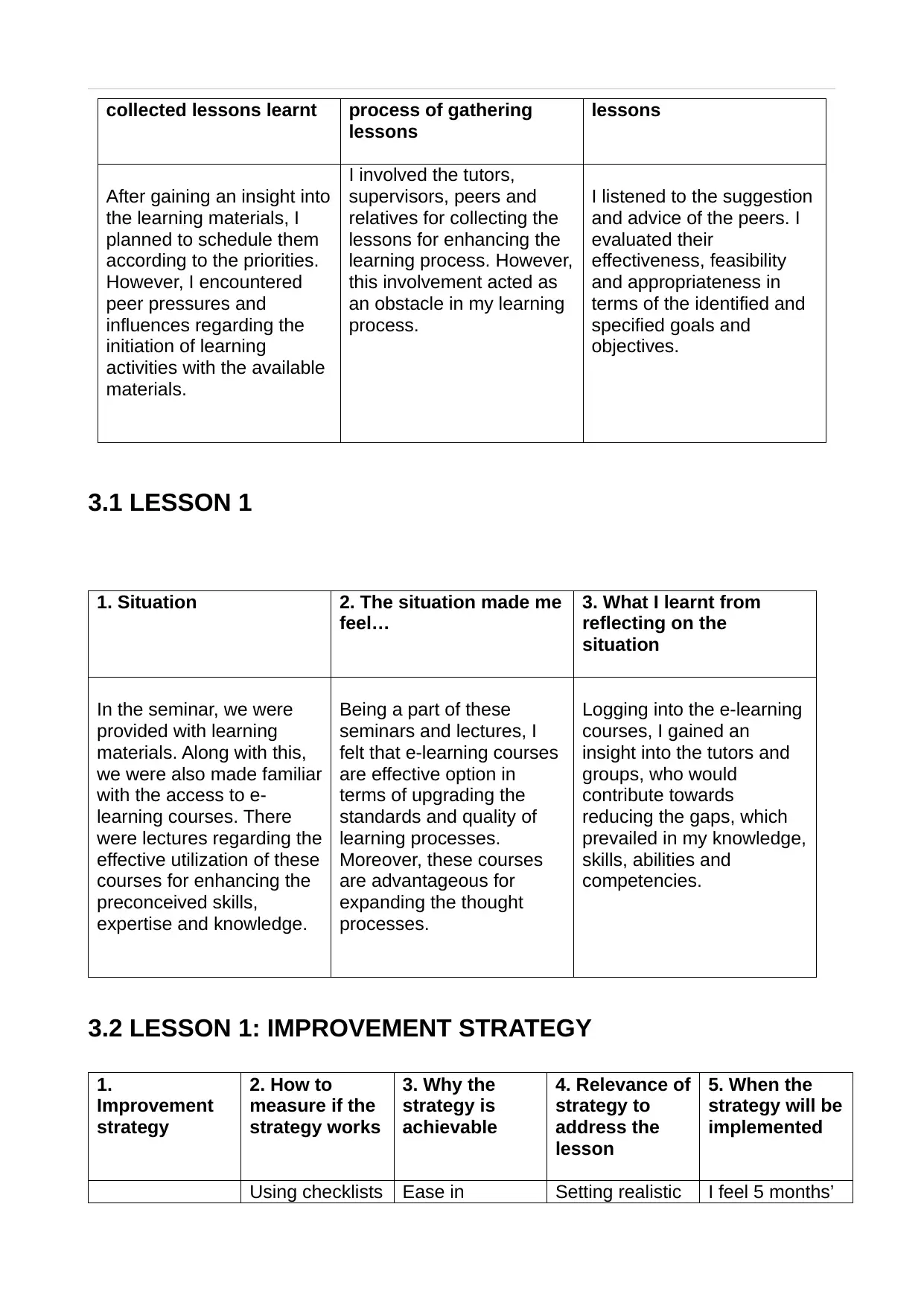
collected lessons learnt process of gathering
lessons
lessons
After gaining an insight into
the learning materials, I
planned to schedule them
according to the priorities.
However, I encountered
peer pressures and
influences regarding the
initiation of learning
activities with the available
materials.
I involved the tutors,
supervisors, peers and
relatives for collecting the
lessons for enhancing the
learning process. However,
this involvement acted as
an obstacle in my learning
process.
I listened to the suggestion
and advice of the peers. I
evaluated their
effectiveness, feasibility
and appropriateness in
terms of the identified and
specified goals and
objectives.
3.1 LESSON 1
1. Situation 2. The situation made me
feel…
3. What I learnt from
reflecting on the
situation
In the seminar, we were
provided with learning
materials. Along with this,
we were also made familiar
with the access to e-
learning courses. There
were lectures regarding the
effective utilization of these
courses for enhancing the
preconceived skills,
expertise and knowledge.
Being a part of these
seminars and lectures, I
felt that e-learning courses
are effective option in
terms of upgrading the
standards and quality of
learning processes.
Moreover, these courses
are advantageous for
expanding the thought
processes.
Logging into the e-learning
courses, I gained an
insight into the tutors and
groups, who would
contribute towards
reducing the gaps, which
prevailed in my knowledge,
skills, abilities and
competencies.
3.2 LESSON 1: IMPROVEMENT STRATEGY
1.
Improvement
strategy
2. How to
measure if the
strategy works
3. Why the
strategy is
achievable
4. Relevance of
strategy to
address the
lesson
5. When the
strategy will be
implemented
Using checklists Ease in Setting realistic I feel 5 months’
lessons
lessons
After gaining an insight into
the learning materials, I
planned to schedule them
according to the priorities.
However, I encountered
peer pressures and
influences regarding the
initiation of learning
activities with the available
materials.
I involved the tutors,
supervisors, peers and
relatives for collecting the
lessons for enhancing the
learning process. However,
this involvement acted as
an obstacle in my learning
process.
I listened to the suggestion
and advice of the peers. I
evaluated their
effectiveness, feasibility
and appropriateness in
terms of the identified and
specified goals and
objectives.
3.1 LESSON 1
1. Situation 2. The situation made me
feel…
3. What I learnt from
reflecting on the
situation
In the seminar, we were
provided with learning
materials. Along with this,
we were also made familiar
with the access to e-
learning courses. There
were lectures regarding the
effective utilization of these
courses for enhancing the
preconceived skills,
expertise and knowledge.
Being a part of these
seminars and lectures, I
felt that e-learning courses
are effective option in
terms of upgrading the
standards and quality of
learning processes.
Moreover, these courses
are advantageous for
expanding the thought
processes.
Logging into the e-learning
courses, I gained an
insight into the tutors and
groups, who would
contribute towards
reducing the gaps, which
prevailed in my knowledge,
skills, abilities and
competencies.
3.2 LESSON 1: IMPROVEMENT STRATEGY
1.
Improvement
strategy
2. How to
measure if the
strategy works
3. Why the
strategy is
achievable
4. Relevance of
strategy to
address the
lesson
5. When the
strategy will be
implemented
Using checklists Ease in Setting realistic I feel 5 months’
⊘ This is a preview!⊘
Do you want full access?
Subscribe today to unlock all pages.

Trusted by 1+ million students worldwide
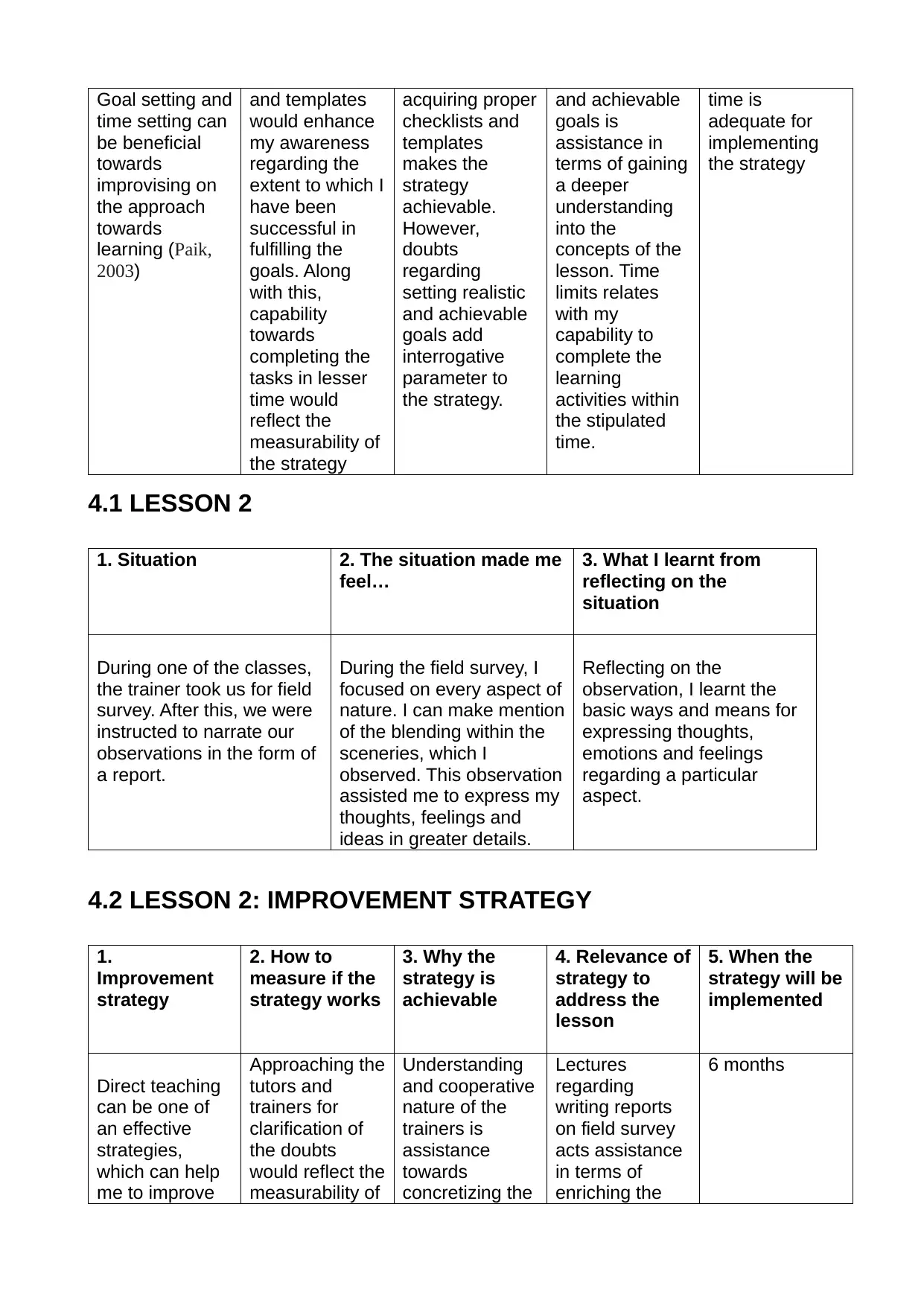
Goal setting and
time setting can
be beneficial
towards
improvising on
the approach
towards
learning (Paik,
2003)
and templates
would enhance
my awareness
regarding the
extent to which I
have been
successful in
fulfilling the
goals. Along
with this,
capability
towards
completing the
tasks in lesser
time would
reflect the
measurability of
the strategy
acquiring proper
checklists and
templates
makes the
strategy
achievable.
However,
doubts
regarding
setting realistic
and achievable
goals add
interrogative
parameter to
the strategy.
and achievable
goals is
assistance in
terms of gaining
a deeper
understanding
into the
concepts of the
lesson. Time
limits relates
with my
capability to
complete the
learning
activities within
the stipulated
time.
time is
adequate for
implementing
the strategy
4.1 LESSON 2
1. Situation 2. The situation made me
feel…
3. What I learnt from
reflecting on the
situation
During one of the classes,
the trainer took us for field
survey. After this, we were
instructed to narrate our
observations in the form of
a report.
During the field survey, I
focused on every aspect of
nature. I can make mention
of the blending within the
sceneries, which I
observed. This observation
assisted me to express my
thoughts, feelings and
ideas in greater details.
Reflecting on the
observation, I learnt the
basic ways and means for
expressing thoughts,
emotions and feelings
regarding a particular
aspect.
4.2 LESSON 2: IMPROVEMENT STRATEGY
1.
Improvement
strategy
2. How to
measure if the
strategy works
3. Why the
strategy is
achievable
4. Relevance of
strategy to
address the
lesson
5. When the
strategy will be
implemented
Direct teaching
can be one of
an effective
strategies,
which can help
me to improve
Approaching the
tutors and
trainers for
clarification of
the doubts
would reflect the
measurability of
Understanding
and cooperative
nature of the
trainers is
assistance
towards
concretizing the
Lectures
regarding
writing reports
on field survey
acts assistance
in terms of
enriching the
6 months
time setting can
be beneficial
towards
improvising on
the approach
towards
learning (Paik,
2003)
and templates
would enhance
my awareness
regarding the
extent to which I
have been
successful in
fulfilling the
goals. Along
with this,
capability
towards
completing the
tasks in lesser
time would
reflect the
measurability of
the strategy
acquiring proper
checklists and
templates
makes the
strategy
achievable.
However,
doubts
regarding
setting realistic
and achievable
goals add
interrogative
parameter to
the strategy.
and achievable
goals is
assistance in
terms of gaining
a deeper
understanding
into the
concepts of the
lesson. Time
limits relates
with my
capability to
complete the
learning
activities within
the stipulated
time.
time is
adequate for
implementing
the strategy
4.1 LESSON 2
1. Situation 2. The situation made me
feel…
3. What I learnt from
reflecting on the
situation
During one of the classes,
the trainer took us for field
survey. After this, we were
instructed to narrate our
observations in the form of
a report.
During the field survey, I
focused on every aspect of
nature. I can make mention
of the blending within the
sceneries, which I
observed. This observation
assisted me to express my
thoughts, feelings and
ideas in greater details.
Reflecting on the
observation, I learnt the
basic ways and means for
expressing thoughts,
emotions and feelings
regarding a particular
aspect.
4.2 LESSON 2: IMPROVEMENT STRATEGY
1.
Improvement
strategy
2. How to
measure if the
strategy works
3. Why the
strategy is
achievable
4. Relevance of
strategy to
address the
lesson
5. When the
strategy will be
implemented
Direct teaching
can be one of
an effective
strategies,
which can help
me to improve
Approaching the
tutors and
trainers for
clarification of
the doubts
would reflect the
measurability of
Understanding
and cooperative
nature of the
trainers is
assistance
towards
concretizing the
Lectures
regarding
writing reports
on field survey
acts assistance
in terms of
enriching the
6 months
Paraphrase This Document
Need a fresh take? Get an instant paraphrase of this document with our AI Paraphraser
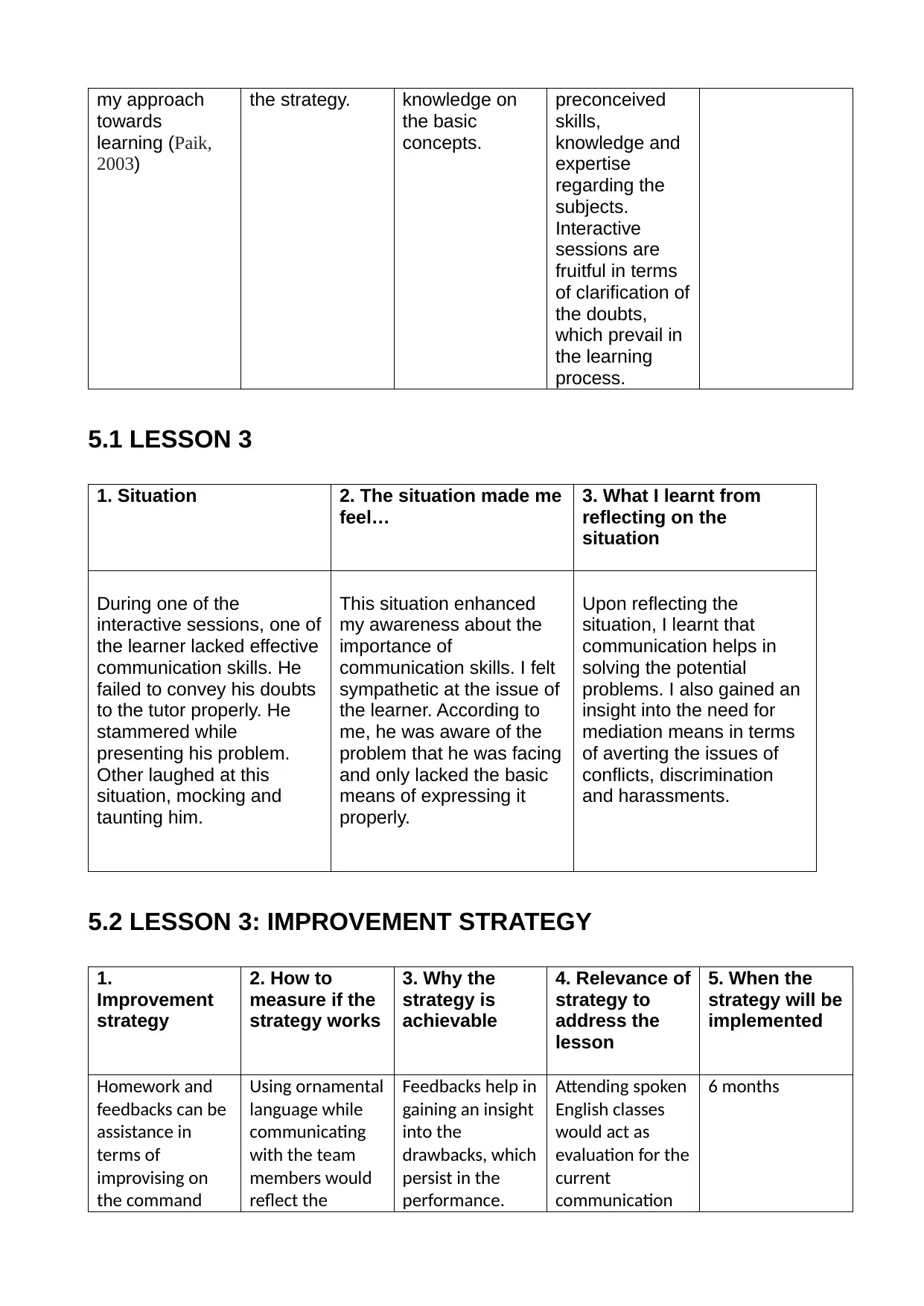
my approach
towards
learning (Paik,
2003)
the strategy. knowledge on
the basic
concepts.
preconceived
skills,
knowledge and
expertise
regarding the
subjects.
Interactive
sessions are
fruitful in terms
of clarification of
the doubts,
which prevail in
the learning
process.
5.1 LESSON 3
1. Situation 2. The situation made me
feel…
3. What I learnt from
reflecting on the
situation
During one of the
interactive sessions, one of
the learner lacked effective
communication skills. He
failed to convey his doubts
to the tutor properly. He
stammered while
presenting his problem.
Other laughed at this
situation, mocking and
taunting him.
This situation enhanced
my awareness about the
importance of
communication skills. I felt
sympathetic at the issue of
the learner. According to
me, he was aware of the
problem that he was facing
and only lacked the basic
means of expressing it
properly.
Upon reflecting the
situation, I learnt that
communication helps in
solving the potential
problems. I also gained an
insight into the need for
mediation means in terms
of averting the issues of
conflicts, discrimination
and harassments.
5.2 LESSON 3: IMPROVEMENT STRATEGY
1.
Improvement
strategy
2. How to
measure if the
strategy works
3. Why the
strategy is
achievable
4. Relevance of
strategy to
address the
lesson
5. When the
strategy will be
implemented
Homework and
feedbacks can be
assistance in
terms of
improvising on
the command
Using ornamental
language while
communicating
with the team
members would
reflect the
Feedbacks help in
gaining an insight
into the
drawbacks, which
persist in the
performance.
Attending spoken
English classes
would act as
evaluation for the
current
communication
6 months
towards
learning (Paik,
2003)
the strategy. knowledge on
the basic
concepts.
preconceived
skills,
knowledge and
expertise
regarding the
subjects.
Interactive
sessions are
fruitful in terms
of clarification of
the doubts,
which prevail in
the learning
process.
5.1 LESSON 3
1. Situation 2. The situation made me
feel…
3. What I learnt from
reflecting on the
situation
During one of the
interactive sessions, one of
the learner lacked effective
communication skills. He
failed to convey his doubts
to the tutor properly. He
stammered while
presenting his problem.
Other laughed at this
situation, mocking and
taunting him.
This situation enhanced
my awareness about the
importance of
communication skills. I felt
sympathetic at the issue of
the learner. According to
me, he was aware of the
problem that he was facing
and only lacked the basic
means of expressing it
properly.
Upon reflecting the
situation, I learnt that
communication helps in
solving the potential
problems. I also gained an
insight into the need for
mediation means in terms
of averting the issues of
conflicts, discrimination
and harassments.
5.2 LESSON 3: IMPROVEMENT STRATEGY
1.
Improvement
strategy
2. How to
measure if the
strategy works
3. Why the
strategy is
achievable
4. Relevance of
strategy to
address the
lesson
5. When the
strategy will be
implemented
Homework and
feedbacks can be
assistance in
terms of
improvising on
the command
Using ornamental
language while
communicating
with the team
members would
reflect the
Feedbacks help in
gaining an insight
into the
drawbacks, which
persist in the
performance.
Attending spoken
English classes
would act as
evaluation for the
current
communication
6 months
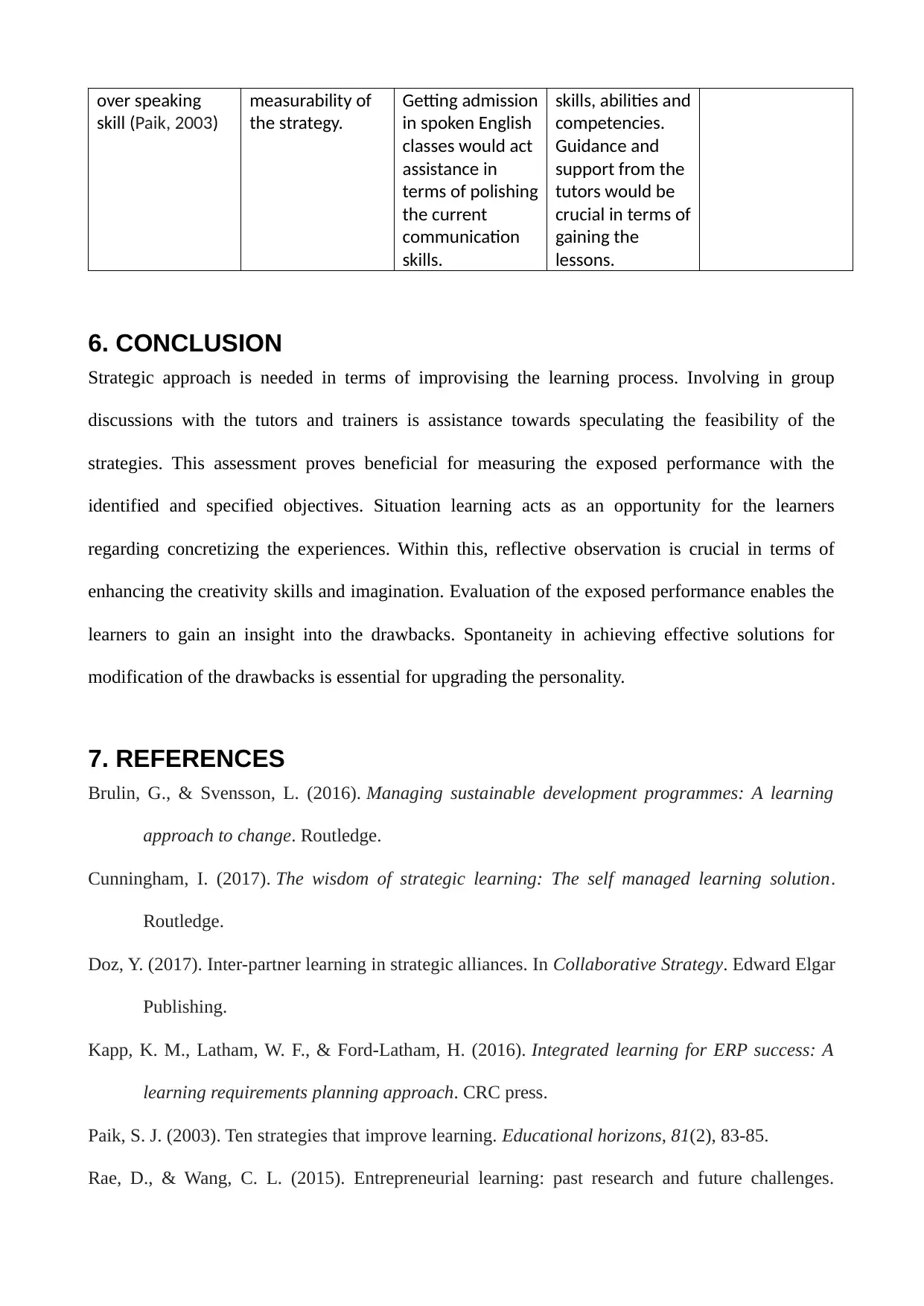
over speaking
skill (Paik, 2003)
measurability of
the strategy.
Getting admission
in spoken English
classes would act
assistance in
terms of polishing
the current
communication
skills.
skills, abilities and
competencies.
Guidance and
support from the
tutors would be
crucial in terms of
gaining the
lessons.
6. CONCLUSION
Strategic approach is needed in terms of improvising the learning process. Involving in group
discussions with the tutors and trainers is assistance towards speculating the feasibility of the
strategies. This assessment proves beneficial for measuring the exposed performance with the
identified and specified objectives. Situation learning acts as an opportunity for the learners
regarding concretizing the experiences. Within this, reflective observation is crucial in terms of
enhancing the creativity skills and imagination. Evaluation of the exposed performance enables the
learners to gain an insight into the drawbacks. Spontaneity in achieving effective solutions for
modification of the drawbacks is essential for upgrading the personality.
7. REFERENCES
Brulin, G., & Svensson, L. (2016). Managing sustainable development programmes: A learning
approach to change. Routledge.
Cunningham, I. (2017). The wisdom of strategic learning: The self managed learning solution.
Routledge.
Doz, Y. (2017). Inter-partner learning in strategic alliances. In Collaborative Strategy. Edward Elgar
Publishing.
Kapp, K. M., Latham, W. F., & Ford-Latham, H. (2016). Integrated learning for ERP success: A
learning requirements planning approach. CRC press.
Paik, S. J. (2003). Ten strategies that improve learning. Educational horizons, 81(2), 83-85.
Rae, D., & Wang, C. L. (2015). Entrepreneurial learning: past research and future challenges.
skill (Paik, 2003)
measurability of
the strategy.
Getting admission
in spoken English
classes would act
assistance in
terms of polishing
the current
communication
skills.
skills, abilities and
competencies.
Guidance and
support from the
tutors would be
crucial in terms of
gaining the
lessons.
6. CONCLUSION
Strategic approach is needed in terms of improvising the learning process. Involving in group
discussions with the tutors and trainers is assistance towards speculating the feasibility of the
strategies. This assessment proves beneficial for measuring the exposed performance with the
identified and specified objectives. Situation learning acts as an opportunity for the learners
regarding concretizing the experiences. Within this, reflective observation is crucial in terms of
enhancing the creativity skills and imagination. Evaluation of the exposed performance enables the
learners to gain an insight into the drawbacks. Spontaneity in achieving effective solutions for
modification of the drawbacks is essential for upgrading the personality.
7. REFERENCES
Brulin, G., & Svensson, L. (2016). Managing sustainable development programmes: A learning
approach to change. Routledge.
Cunningham, I. (2017). The wisdom of strategic learning: The self managed learning solution.
Routledge.
Doz, Y. (2017). Inter-partner learning in strategic alliances. In Collaborative Strategy. Edward Elgar
Publishing.
Kapp, K. M., Latham, W. F., & Ford-Latham, H. (2016). Integrated learning for ERP success: A
learning requirements planning approach. CRC press.
Paik, S. J. (2003). Ten strategies that improve learning. Educational horizons, 81(2), 83-85.
Rae, D., & Wang, C. L. (2015). Entrepreneurial learning: past research and future challenges.
⊘ This is a preview!⊘
Do you want full access?
Subscribe today to unlock all pages.

Trusted by 1+ million students worldwide
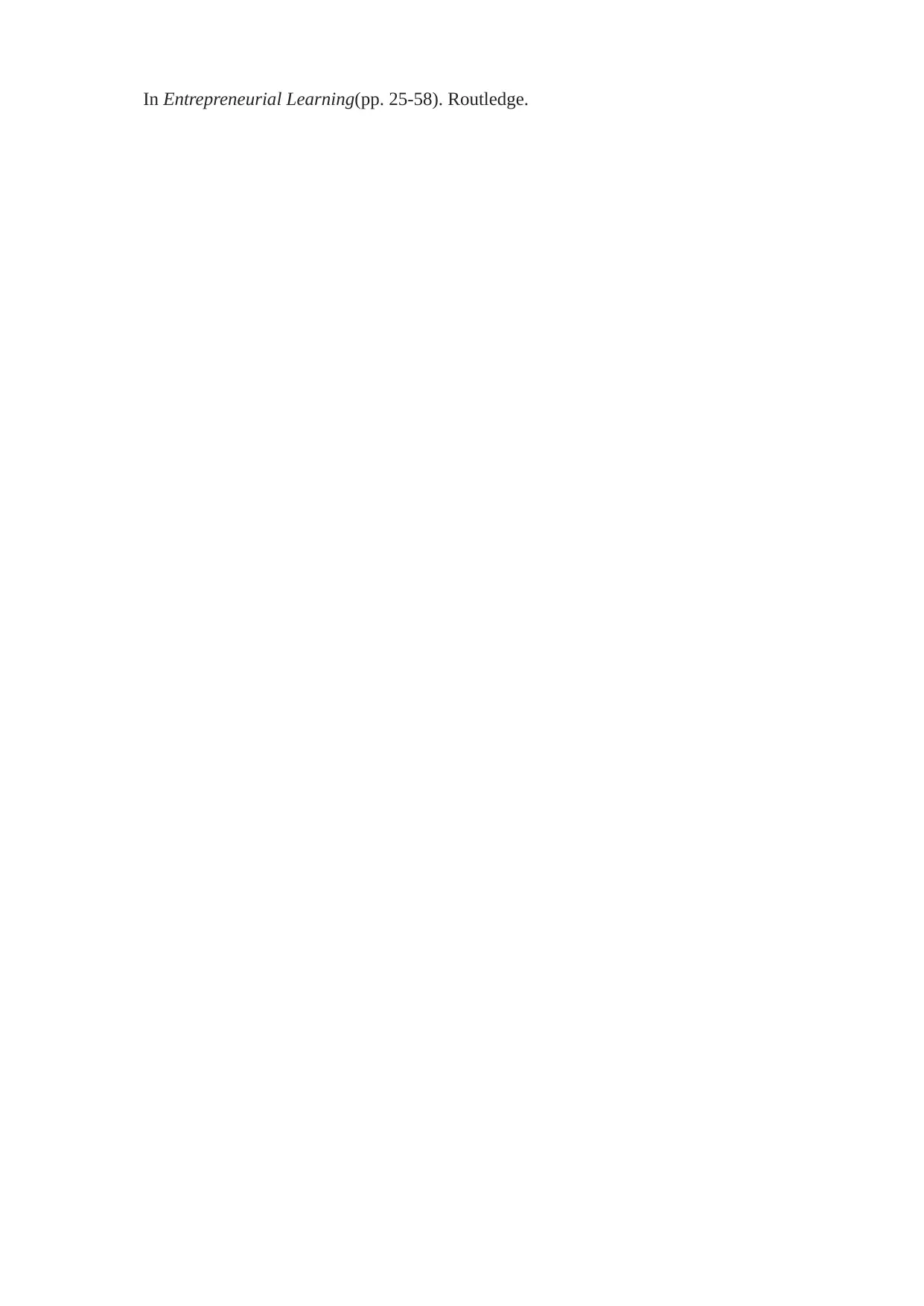
In Entrepreneurial Learning(pp. 25-58). Routledge.
1 out of 7
Related Documents
Your All-in-One AI-Powered Toolkit for Academic Success.
+13062052269
info@desklib.com
Available 24*7 on WhatsApp / Email
![[object Object]](/_next/static/media/star-bottom.7253800d.svg)
Unlock your academic potential
Copyright © 2020–2026 A2Z Services. All Rights Reserved. Developed and managed by ZUCOL.




